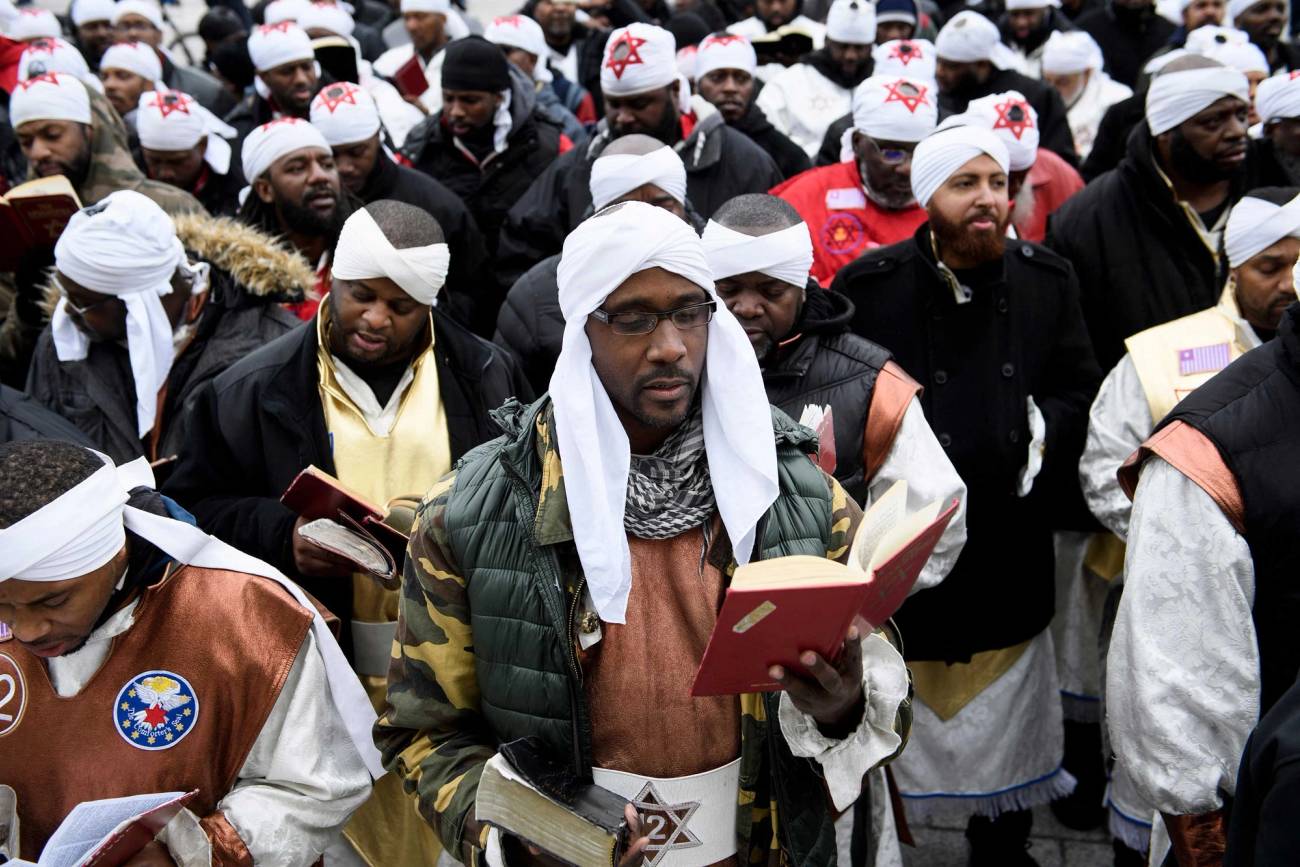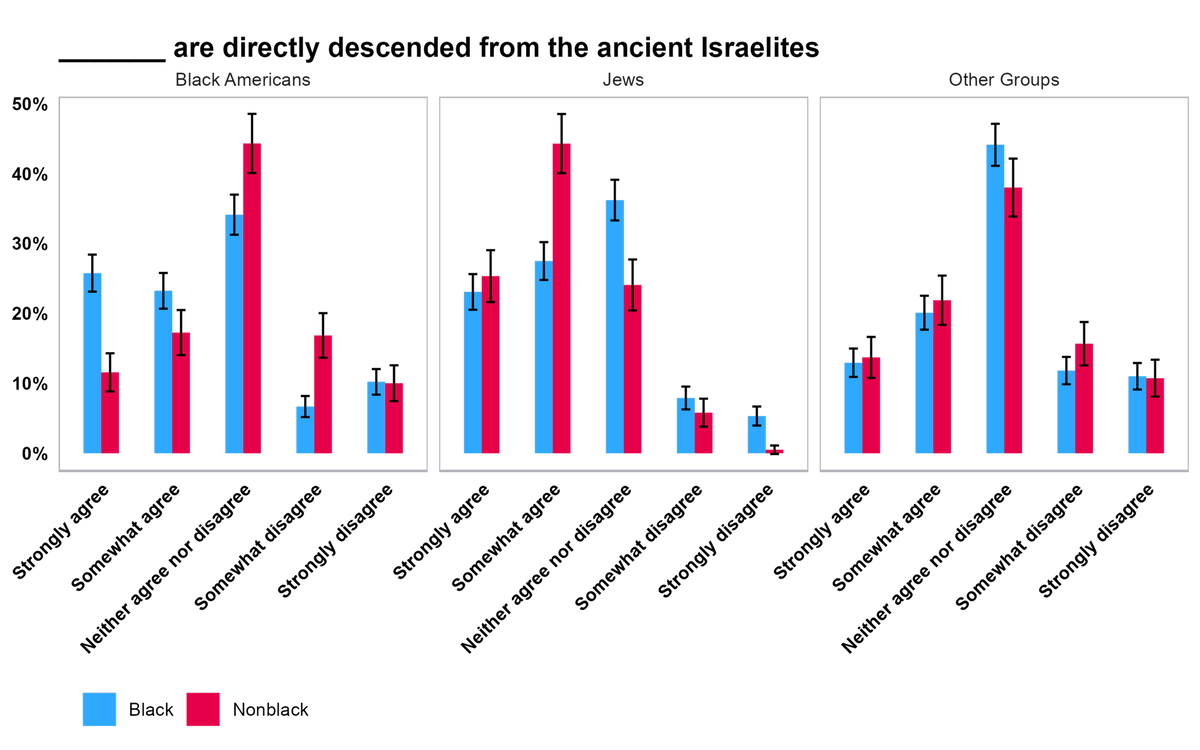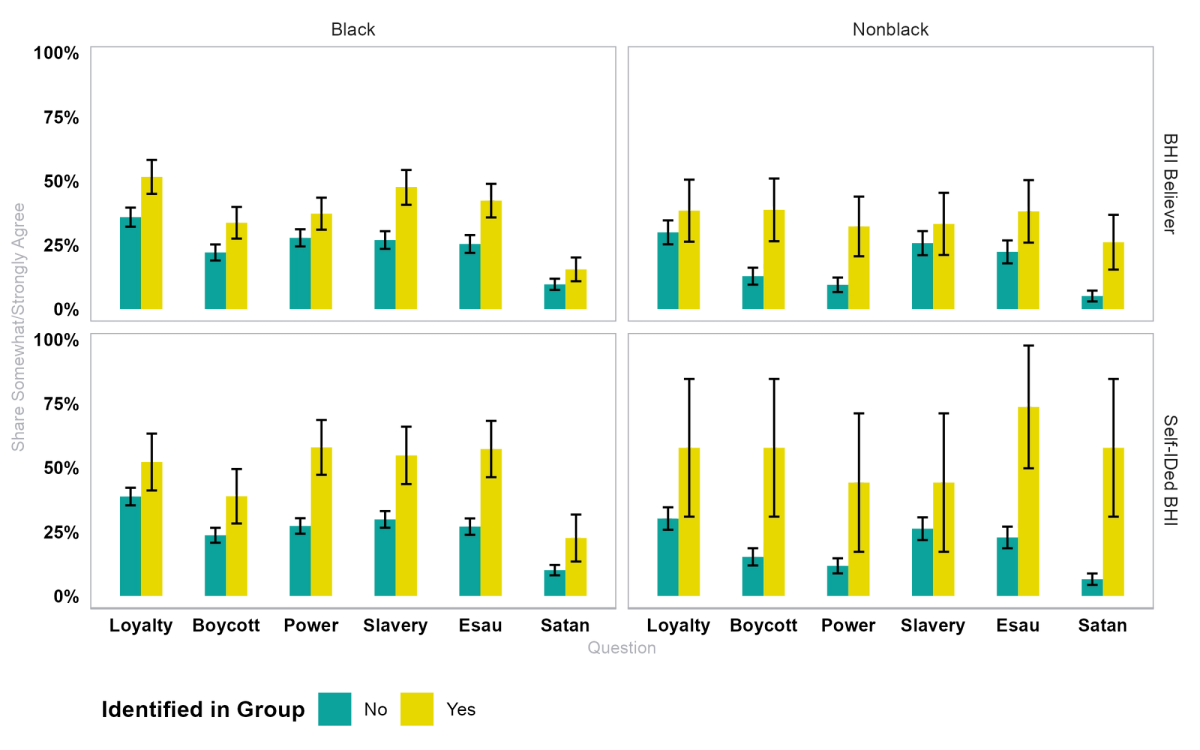Do Black Hebrew Israelites Hate Jews?
A new survey shows that a controversial group is both more numerous and more complicated than press reports have suggested

Brendan Smialowski/AFP via Getty Images

Brendan Smialowski/AFP via Getty Images

Brendan Smialowski/AFP via Getty Images
Last month, a 34-year-old woman was arrested in Indianapolis after she backed her car into a building decorated with a Star of David while shouting “Free Palestine!” Ruba Almaghtheh reportedly responded to footage of the war in Gaza by attacking what she thought was an “Israel school,” in support of “her people back in Palestine.” She now faces three felony charges.
Almaghtheh’s botched attack would have been just another in the long list of antisemitic incidents since Oct. 7, except for the fact that the target was not a Jewish or Israeli institution at all. It was, in fact, the Indianapolis outpost of the “Israelite School of Universal and Practical Knowledge,” one of the many sects that collectively fall under the umbrella of Black Hebrew Israelism. The house itself features a crudely painted white Star of David under the letters “ISUPK,” as well as a sign reading “1 West 125th Street Harlem New York”—a reference to the One West extremist school of Hebrew Israelism formed in the 1960s.
The Indianapolis attack was, in this regard, deeply ironic, as members of groups like ISUPK are not only not Jews but are often recognized for their vicious antisemitism. ISUPK’s leader, General Yahanna, has called Jews “straight thie[ves] of the Hebrew culture,” while the Southern Poverty Law Center quotes a chapter member as saying “the only real Jews on the planet are the black, Hispanic, and native Indians ... Even Hitler knew it.” Readers are most likely to recognize Black Hebrew Israelites (BHIs) from their street preaching in major cities. Their comments there—with calls for stoning of gays and genocide of whites—make even these remarks sound tame.
It is no surprise, then, that when Black Hebrew Israelism has entered into the public eye in recent years, it has almost always been in association with antisemitism. When NBA player Kyrie Irving tweeted a link to a film about how Jews were responsible for the slave trade, the men who showed up to support his first game back from suspension were BHIs. When Kanye West defended himself against charges of antisemitism by claiming that Black people were Jews, he was repeating BHI beliefs.
One way to square these findings is to situate Black Hebrew Israelism in the long, proud American tradition of the conspiracy theory. It is a race-specific expression of a profoundly American tendency.
The paradox of a group best known for strange, antisemitic theories themselves becoming victims of antisemitism suggests that BHIs are more complicated than a simple group of bigots, though. Indeed, the core idea of Black Hebrew Israelism—that modern American Blacks are descended from the Twelve Tribes of Israel—has been around since the 19th century. Analysts generally assert that only some “extreme” BHIs believe Jews themselves are not really descended from the Twelve Tribes. Yet there is surprisingly little quantitative work on BHIs and their beliefs. In 2022, The Times of Israel could find only one survey estimating the size of the BHI population. That survey, a 1,000-person sample of Black Americans, asked just one question about familiarity with Black Hebrew Israelism. It found that about 4% of respondents considered themselves BHIs, while another 19% agreed with the “core ideas” of Black Hebrew Israelism.
That single question leaves many unanswered. What are respondents thinking of when they agree with the “core ideas” of Black Hebrew Israelism? How common are those ideas in the non-Black population? And what is the relationship between professing key BHI ideas and extreme expressions of Hebrew Israelism like antisemitism?
In a recent survey I conducted for the Manhattan Institute, I administered an online questionnaire to 1,075 self-identified Black respondents, as well as 555 non-Black respondents. Each group received four sets of questions. One was meant to measure whether or not they agreed with key BHI ideas—the claim that Black people are descended from the ancient Israelites, or the claim that Jews are not. The second used two different measures to try to understand how BHIs think about Jews, and how their thinking varies from non-BHIs. The third covered support for violence, both interpersonal and political. Lastly, they were asked about key demographic details.
Before asking what BHIs think, it’s important to first decide what we mean by Black Hebrew Israelites. I focused on the core BHI belief: that modern Black Americans are descended from the Twelve Tribes of Israel. Respondents were first asked to read a paragraph describing the biblical Twelve Tribes. They were then asked if they were familiar with the story, and which of three groups they believed were descended from the “ancient Israelites”: Black Americans, Jews, and other nonwhite Americans.

The Manhattan Institute
A few things emerge from the data. One is that Black respondents were appreciably more likely than non-Black respondents to say that other Black people were descended from the ancient Israelites: 49% of the Black sample somewhat or strongly agree that Black Americans are descended from the Israelites, versus 29% of the non-Black sample, while 13% of Black respondents somewhat or strongly disagree that Jews are descended from the Israelites (versus 6% of the non-Black sample). In other words, some people, both Black and non-Black, will agree with both claims. But agreement with both is about twice as likely in the Black population versus the non-Black.
But which of these respondents is an actual Black Hebrew Israelite? I created two categories to try to capture this group: The first is respondents who a) believe Black people are descended from the ancient Israelites and b) say they are familiar with the story of the ancient Israelites (because someone who’s not familiar can’t really credibly have opinions). I call these “BHI believers.” The second is those who fit into this group but who also self-identified as BHIs when asked; I called these “self-IDed BHI.”
The first major finding of the survey is that each of these categories is relatively large. I estimate that about a quarter of the Black population believes that Black people are descended from the ancient Israelites, while about 9% are self-IDed BHI. In the non-Black population, the equivalent figures are 14% and 3%. (The idea that 3% of non-Black people identify as BHIs may be confusing. But this group is small enough—only 13 respondents in the whole survey—that they may just represent unreliable survey takers, rather than true believers.)
The first thing to note is that these figures are unexpectedly large. It’s also important to remember that not every Black person who thinks that they are descended from the biblical Twelve Tribes is a raving antisemite or a radical street preacher. That’s why I then test the association between being in one of these categories and both antisemitism and support for extremism.
I use two different measures to assess respondents’ antisemitism. One is a series of “feelings thermometers,” which ask respondents to express how “cold” or “warm” they feel toward a variety of groups—including Jews—on a scale from 0 to 100. Another was a series of statements, drawn partly from the work of Eitan Hersh and Laura Royden, which capture antisemitic opinions. These are statements like “Jews in the United States have too much power” or “Relative to other white people, Jews were significantly more involved in and profited more from the trans-Atlantic slave trade.”
Somewhat surprisingly, the two measures give conflicting impressions of the antisemitism of the BHI-believing and identified populations. Relative to nonbelievers or identifiers in the same sample, those who profess BHI beliefs or identify as BHI are warmer toward Jews by statistically significant margins. BHIs do seem to be “warmer” toward other groups overall, but accounting for this statistically still leaves BHIs approximately as warm toward Jews as their non-BHI peers.

The Manhattan Institute
At the same time, BHI believers are much more likely to agree with antisemitic statements, like “It is appropriate for opponents of Israel’s policies and actions to boycott Jewish-American-owned businesses” or “Jews were significantly more involved in and profited more from the trans-Atlantic slave trade.” That’s true by both definitions and in both samples. BHIs are also more likely to say that contemporary Jews are not descended from the ancient Israelites.
BHIs, in other words, are no less cold toward the Jews than their non-BHI peers, and arguably are warmer. At the same time, they also believe a lot of kooky, possibly dangerous stuff about Jews. Reconciling that tension may give us a better understanding of the BHI phenomenon.
A similar tension shows up in the last module, which asks respondents whether they would support violence in certain hypothetical scenarios. In the first set, respondents are asked if it is justified for one man to hit another in certain situations—if the latter man is drunk, or if he’s breaking into the former man’s house, for example. Interestingly, the Black BHI-identified group were not meaningfully more likely than their non-BHI Black peers to support violence in any of the four situations.
However, a different story appears in questions, drawn from a widely cited study, about violence to achieve political purposes, e.g., to oppose discrimination. There, the BHI respondents were more likely to support the use of violence, a result that reached statistical significance when the questions were pooled. What this suggests, in short, is that BHIs do not differ from their non-BHI peers on support for interpersonal violence—such as hitting another man in the face. But they may be more supportive of political violence—taking up arms to support your ideology, for example.
These results are really only a first, and highly imperfect, glimpse at a chronically understudied group. That said, the diffuse data points produced by this survey should cause us to refine our understanding of Black Hebrew Israelism. At a first pass, we should not think about Black Hebrew Israelism as simply one of the ways that Black antisemitism expresses itself. Rather, the data suggests thinking of BHI as a particular, race-coded expression of a more general social tendency toward conspiratorial or extreme beliefs—a tendency which can be benign but can also, in the wrong circumstances, be dangerous.
Return to the conflicting antisemitism results: BHIs are warmer on, or equally warm toward, Jews, compared to their same-race peers. But they also are more willing to express agreement with a variety of false claims about Jews. What can explain this disparity? One (quite possible) explanation is measurement error: Perhaps respondents who considered themselves Jewish were confused about what “Jews” meant in the thermometer questions. Another explanation is that respondents (on average) saw no tension between being warm toward Jews and believing these things. They are not personally vicious—indeed, BHIs are warmer toward all groups than non-BHIs. But on an intellectual level, they believe a number of strange things about Jews which could be predicates to harmful behavior.
One way to square these findings, perhaps, is to situate Black Hebrew Israelism in the long, proud American tradition of the conspiracy theory. Black Hebrew Israelism is not an aberration or peculiarity of a particular subset of the American Black community; it is a race-specific expression of a profoundly American tendency.
Conspiracy theories are immensely popular in American life, and have been for decades. Two-thirds of Americans doubt the official story of the Kennedy assassination; smaller but appreciable shares will agree that we have made contact with aliens or fluoridated water is for mind control. Though conspiracy thinking is often claimed by the legacy left-wing press to be primarily a right-wing phenomenon, political science research has shown that conspiracism is equally common across the political spectrum. As John-Paul Pagano has written in Tablet, antisemitism itself—expressed by Black or white—is a conspiracy theory, an expression of opposition to the sinister cabal of Jews who allegedly run the world.
Black Hebrew Israelism, in this view, is a peculiarly American thing. The idea that Black people are secretly descended from the Twelve Tribes is, after all, an extension and literalization of the analogy John Winthrop drew between the old Jerusalem and the Massachusetts Bay Colony. (Black Hebrew Israelism, Jacob Dorman writes, was invented in the United States and only subsequently exported to Africa.) The peculiar antisemitic ideas and zeal for political violence are, too, reflections of ideas that have their place in American culture writ large.
This does not mean that Black Hebrew Israelite ideas aren’t potentially dangerous. Conspiratorial thinking can be a predicate to extremist violence, and it is not an accident that BHIs have been implicated in plenty of antisemitic attacks and raw antisemitic utterances over the past decade. Then again, so have people across the broad spectrum of American political beliefs, from the far left to the far right. Understanding BHI as a branch of the larger American conspiratorial tendency should induce in us, if not sympathy, then at least the greater depths of insight required to manage its more extreme expressions, and preventing the harms associated therewith.
Charles Fain Lehman is a fellow at the Manhattan Institute, a contributing editor of City Journal, and a 2023-24 Robert Novak fellow with the Fund for American Studies.